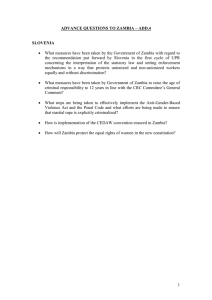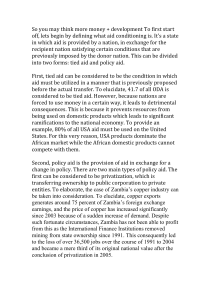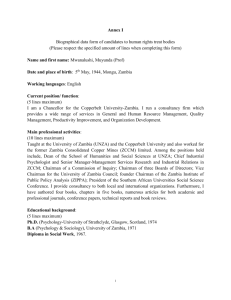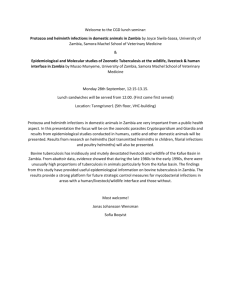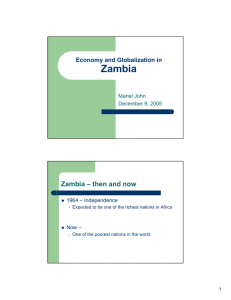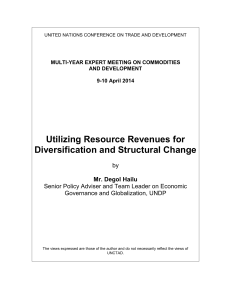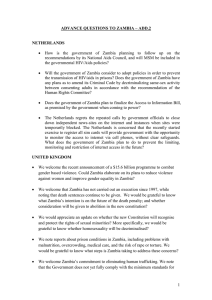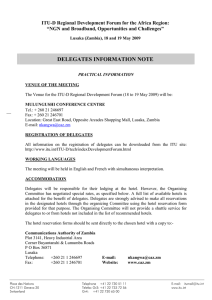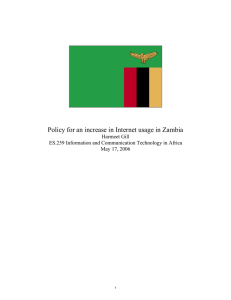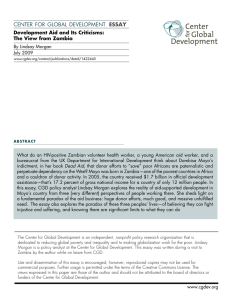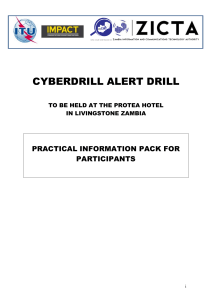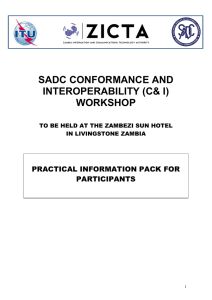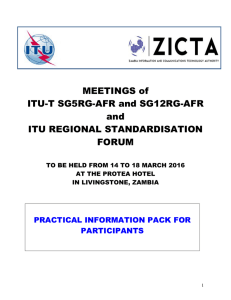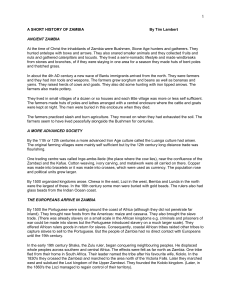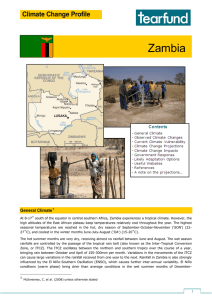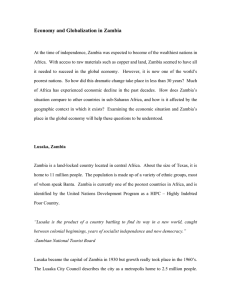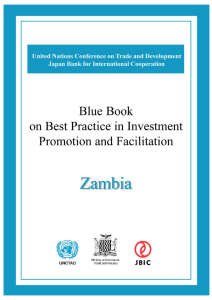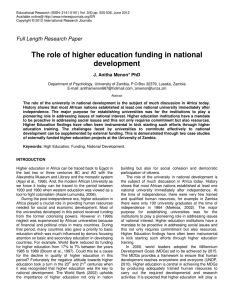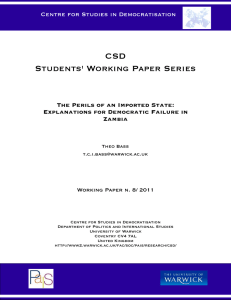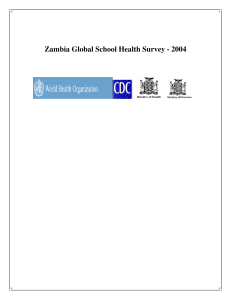Enabling nature of international trade through adequate policy design and interventions and its contribution to inclusive and sustainable development, Lillian Bwalya, Director of Trade, Ministry of Commerce, Trade and Industry, Zambia
advertisement
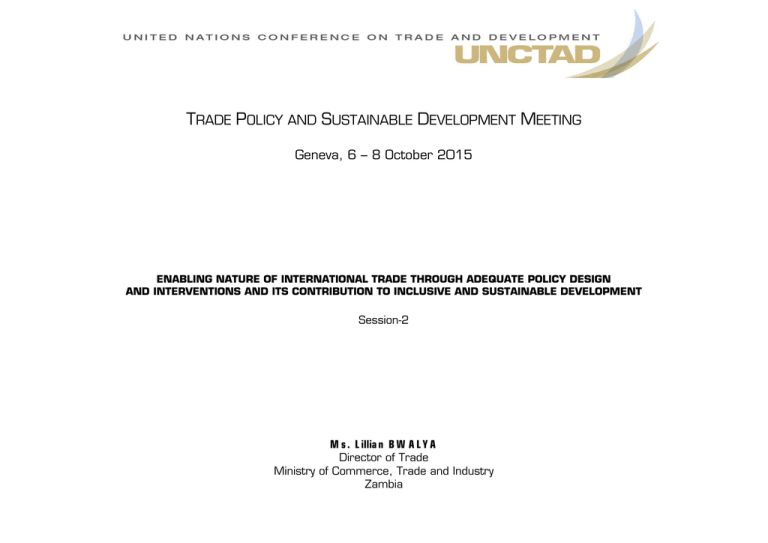
TRADE POLICY AND SUSTAINABLE DEVELOPMENT MEETING Geneva, 6 -- 8 October 2015 ENABLING NATURE OF INTERNATIONAL TRADE THROUGH ADEQUATE POLICY DESIGN AND INTERVENTIONS AND ITS CONTRIBUTION TO INCLUSIVE AND SUSTAINABLE DEVELOPMENT Session-2 M s . L illia n B W A L Y A Director of Trade Ministry of Commerce, Trade and Industry Zambia ENABLING NATURE OF INTERNATIONAL TRADE THROUGH ADEQUATE POLICY DESIGN AND INTERVENTIONS AND ITS CONTRIBUTION TO INCLUSIVE AND SUSTAINABLE DEVELOPMENT ZAMBIA’S TRADE POLICY FRAMEWORK 6 -8 OCTOBER, 2015 OVERVIEW The exercise leading to the drafting of the Trade Policy Framework included the following elements: A review of Zambia’s Trade performance with a view to identifying constraints and opportunities; An assessment of national policy framework, including border measures, the domestic regulatory frameworks as well as trade related arrangements/initiatives at bilateral, regional, continental and global levels An outline of possible options to address constraints identified with a view to ensuring that Zambia’s trade policy framework was development oriented CONTEXT Landlocked Least Developed Country – issues of high trade costs Predominantly a mineral economy highly dependent on Copper – in the face of falling copper prices Striving to diversify and reduce dependency on Copper export earnings Currently pursuing an outward oriented export led Trade Strategy. – narrow export base Dependent on customs duties to raise Government revenue- in face of shrinking duties (FTAs) CONTEXT Fragile industrial base Agriculture account for 52.2% of the national workforce. Small internal market Low level of services export contribution to GDP at 2.9% Constraining commitments at regional and multilateral level, (i.e. FTAs have come with challenges for some producers, Addressing constraints internally, and tackling border issues and Integrating regionally and globally are critical considerations for Zambia’s Trade Policy THE DESIGN STAGE Several consideration must be taken into account at the design stage including the following: Inclusiveness of the consultative process (public , private sector, civil society) Ownership of the consultative process – lead MCTI Context of the policy framework: national, regional, continental and global Object of the policy: Contribute to industrialisation and job creation, and ultimately people centred growth and development DESIGN STAGE Although UNCTAD provided financial and technical support towards the design and finalisation of Zambia’s Trade Policy Framework Document, the consultative process was country driven: The Ministry responsible for Trade and Industry took a leading role in coordinating the consultations; and A local consultant was hired to draft the Framework Document. Elements of the document were designed, taking into account the prevailing conditions at Country level, while recognising regional, continental and global influences Object of the exercise being a policy framework that contributes to industrialisation and job creation, and ultimately, people centred economic growth and development DEFINING INTERVENTION AREAS There are a number of considerations that need to be taken into account when identifying intervention areas. These include: The need to assess what is politically feasible; What is beneficial to the country; What is practical Balancing competing stakeholders interests (Producers, Traders, Exporters) DEFINING INTERVENTION AREAS *CONT How coherent are the measures being promoted with national priorities How dynamic are the interventions in light of changes taking place at regional continental and international levels. What tools would be employed to assess whether the policy was appropriately designed and effective in promoting development. Weighing impact of measures proposed on different sectors, while promoting effectiveness and practicalities of the measures in question. Feedback mechanisms: monitoring and evaluation, assessment of impact RECOMMENDATIONS Overall Economic stability; Approach to achieving diversification and value addition –with a regional focus; Global visibility – continued participation in multilateral fora such as the WTO; Embracing programmes aimed at reducing the cost of trade and production in order to enhance competitiveness; Deliberate focus on growing the services sector with the ultimate objective of enhancing trade in services while ensuring that the services sector supports other productive sectors; RECOMMENDATIONS *CONT Promoting coherence in Zambia’s investment, trade, agriculture and industrial sector policies for maximum results and impact. Develop production networks and value chains in the region and globally; Development of support infrastructure Prioritising sectors for intervention Improve quality and availability of data to support the decision making process.
